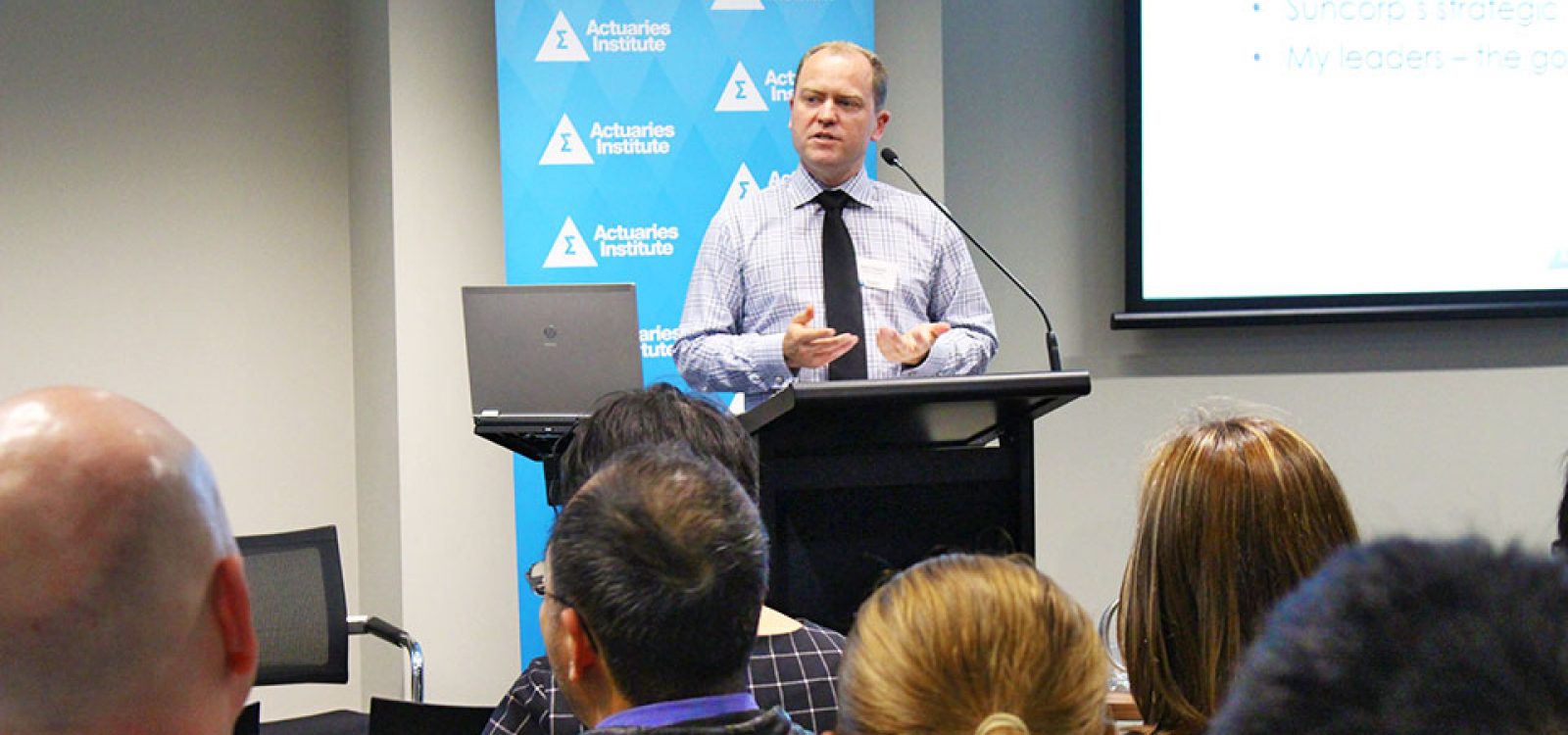
Making Change for the Better
James Fitzpatrick, Chief Customer Officer for AMP’s SMSF business – SuperConcepts, spoke at a recent Leadership Forum of the importance of self-awareness; reflection; caring about your team, and approaching problems from different perspectives. Jenny Lyon and Sara Lee report.
Most of us have a view on the definition of Leadership but we are not always able to articulate it clearly. It was clear that James Fitzpatrick has done a lot of thinking, and learning about leadership during his career. He takes his responsibilities to his staff and the organisation he works for very seriously and ensures he continues to reflect on what works and what doesn’t.
At the recent Leadership Forum on 19 September Leadership as a force for making positive change, James defined leadership for him as “making change for the better” as it applies to self, teams and wider human systems. When he applied for his first leadership role he had to step outside his comfort zone and have the courage to believe that he had the skills and ability to become a good leader. It was obvious in his presentation that he has applied himself proactively to both the theory of leadership and experiential learning.
James is currently the Chief Customer Officer for AMP’s SMSF business – SuperConcepts. His first leadership role was with Suncorp where he subsequently held a variety of senior leadership roles across commercial and personal insurance. This included the opportunity to work on a start-up internally – (the Bingle business) which was key in developing some of his experience. In addition to his hands-on learning he has completed the Benevolent Society’s Sydney Leadership Program in 2012 which is based on the Harvard Adaptive Leadership model being applied to complex social problems.
James considered achieving positive change from three perspectives:
- Self
- Teams, and
- Human Systems
Self-awareness and knowing how others perceive you is key to understanding how you operate as a leader. James takes a structured approach to this and sets time aside to reflect on conversations he has had with staff and the resultant outcome to see what he can observe and learn. One tool he has used effectively is journaling – writing down his thoughts and reflections. This provides a more formal way of recording your idea but also ensures a more consistent approach and one which encourages ongoing learning.
Leading Teams
James highlighted the power of caring when working with your team and believes this is key to building a strong relationship with them. Caring needs to be genuine and is demonstrated by your ability to develop two-way conversations, by listening carefully and by thinking about the personal growth and needs of the individuals in the team. He also believes it is important to live your values, know what they are, do what you say and behave honestly and consistently. A key piece of advice he was given and which informs his behaviour is to always assume the people you are dealing with are “rational, talented and motivated individuals”. This encourages you to understand where they are coming from and to look at things through their lens rather than your own.
Finally, he noted the importance of always providing team members with sufficient information and background when discussing projects, to ensure they have context and are able to understand the whole picture rather than just their part of it.
Human Systems
James reflected on his study with the benevolent society and the models they used to consider larger human systems – as an example, he referred to high schools offering consistent environments where you can observe patterns of behaviour (the behaviours will usually change when people leave that particular structure and environment). By comparing across a range of schools there may be ways to identify improvements and to bring different approaches as a leader to that environment. We took from this that we should be observing and thinking about the structure in which we operate as leaders and considering similarities/differences with other teams and what we might change in order to change culture/behaviour, i.e. apply our learnings.
Challenges for Actuaries
 James noted that there is a strong stereotype of an actuary in some organisations and it is a challenge to move beyond this and demonstrate other diverse experience. He was keen to emphasise that we all bring diversity of thought and that experiences outside work are valuable but we need to find a way of demonstrating this in our work environment. To do this it is important to change your own perspective as well as that of others to understand how you can bring that diversity to the conversation. As an example, he suggested that rather than approaching a problem or project from the position of technical expert we could try to consider it from the customer perspective or from the marketing department perspective. The underlying analysis is potentially the same, bringing the high level of technical excellence, but when thinking about how to present results or to anticipate the questions which may be asked, it is worth considering it from the point of view of others. Perhaps you can reframe your language and approach when speaking to them – this will help to change others’ perspective of you and will make you think differently yourself.
James noted that there is a strong stereotype of an actuary in some organisations and it is a challenge to move beyond this and demonstrate other diverse experience. He was keen to emphasise that we all bring diversity of thought and that experiences outside work are valuable but we need to find a way of demonstrating this in our work environment. To do this it is important to change your own perspective as well as that of others to understand how you can bring that diversity to the conversation. As an example, he suggested that rather than approaching a problem or project from the position of technical expert we could try to consider it from the customer perspective or from the marketing department perspective. The underlying analysis is potentially the same, bringing the high level of technical excellence, but when thinking about how to present results or to anticipate the questions which may be asked, it is worth considering it from the point of view of others. Perhaps you can reframe your language and approach when speaking to them – this will help to change others’ perspective of you and will make you think differently yourself.
One of the comments which James made about himself was that he felt he acted as a peacemaker and acted as a bridge between people. He saw his role as bringing together parties and enabling them to connect and work together, helping to get the best out of people.
When asked whether leaders are born or can be made, James acknowledged that while this is a matter of personal opinion he believes they can be made based on theoretical learning, combined with hands-on experience. However, he did note that when interviewing people for leadership positions there are characteristics which he looks for as he believes this supports them in developing successfully into effective leaders. These characteristics include – strong values (and alignment with the business values), a passion for the business, passion for the people you work with and a generous approach when working with people. He also noted that born or made, all leaders benefit from dedicating time to allow themselves to reflect and understand their behaviours.
James presented very thoughtful, considered and practical views on leadership which we can all learn from. In particular, self-reflection and care for others is key.
Access the presentation and audio from the Leadership Forum.
CPD: Actuaries Institute Members can claim two CPD points for every hour of reading articles on Actuaries Digital.






